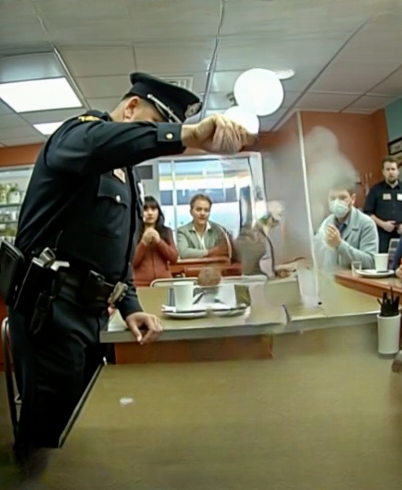The sun had barely risen over the small town, casting its soft golden glow across the sleepy streets. Inside the town’s most beloved diner, life carried on with its usual rhythm. The smell of fresh coffee mingled with the aroma of buttered toast and warm pastries. Plates clattered gently in the kitchen, and the low hum of conversations gave the place its familiar comfort. For years, the diner had been more than a restaurant—it was a gathering place, a corner of the community where people felt seen and connected.
At one end of the counter sat Clara Williams, a middle-aged woman known to many in town for her quiet strength and kindness. A teacher by profession and a mentor by nature, Clara had spent decades guiding young people, instilling in them a love for learning and respect for others. She had also endured her share of hardship, having lost her husband, Senator Robert Williams, who had been a powerful voice for civil rights in their state. Despite her personal losses, Clara carried herself with unwavering dignity.
But on this particular morning, that peace was disrupted in a way that would send ripples throughout the entire community.
The Incident That Shattered the Calm
Detective John Harris, a longtime officer in the local police department, walked into the diner. His uniform was crisp, his badge polished—a symbol of authority and responsibility. Yet beneath the surface, Harris carried biases he had never confronted. They lingered quietly, shaping his views and fueling snap judgments he barely acknowledged.
What happened next unfolded in seconds but would echo for months. In a rash, thoughtless act, Harris poured hot coffee over Clara Williams’ hands as she sat at the counter. The act was not provoked, nor could it be justified. It was the product of prejudice, a small but telling display of how unchecked bias can erupt into harm.
The room fell silent. Cups froze midair. Conversations halted. Patrons stared in shock as Clara quickly steadied herself, her composure rising above the humiliation she had just endured. Instead of lashing out, she stood tall, her eyes calm, her voice steady as she reassured those around her that she was unharmed.
That quiet dignity became the defining image of the morning.
The Immediate Fallout
Detective Harris stood frozen, his authority crumbling in the face of the community’s disapproval. The whispers grew louder, filling the diner like a storm. Some rushed to Clara’s side, offering tissues, water, or simply words of support. Others stared at Harris, their expressions a mixture of anger and disbelief.
For Harris, what had seemed like a fleeting act—born of a bias he had never truly examined—suddenly revealed itself for what it was: indefensible. Even before he left the diner, a knot of guilt had taken root in his chest.
Clara, meanwhile, walked out with grace. Though her hands trembled slightly, her head remained high. Her departure was not one of defeat, but of silent strength.
A Reckoning at the Station
By the time Harris returned to the police station, news of the incident had already begun to spread. He was called into the office of Captain Elaine Richards, a woman whose reputation for fairness and integrity was well known. Her expression when he entered left no doubt that she was deeply disappointed.
“John,” she said firmly, “do you understand the gravity of what you’ve done?”
Harris opened his mouth to respond but no words came.
“Do you even know who that woman is?” Richards pressed.
Harris shook his head.
“Her name is Clara Williams,” the captain continued. “She has taught generations of students in this town. She is respected by her peers, cherished by her neighbors, and loved by countless families. And more than that—she is the widow of Senator Robert Williams. A man who gave his life to the fight for civil rights in this state.”
The revelation hit Harris like a physical blow. He slumped into a chair, the weight of his actions finally crashing down on him. Not only had he humiliated an innocent woman, he had also dishonored the memory of a man who had fought tirelessly for justice.
